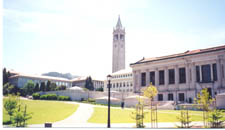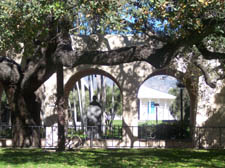 Derek Macmillan grew up on the outskirts of Livingston in Scotland. After completing his BSc at the University of Edinburgh (1995) he began a PhD with Professor Sabine Flitsch on the synthesis of Novel Glycoproteins, also at Edinburgh.
Derek Macmillan grew up on the outskirts of Livingston in Scotland. After completing his BSc at the University of Edinburgh (1995) he began a PhD with Professor Sabine Flitsch on the synthesis of Novel Glycoproteins, also at Edinburgh.
The project involved the generation and overexpression of cysteine mutants of the hormone erythropoietin (EPO) from E. coli, allowing site specific glycosylation using synthetic sugar iodoacetamides.
 After completion of his PhD in 1999 he began research as a Post-doctoral researcher in the laboratory of Professor Carolyn Bertozzi in the Department of Chemistry at the University of California, Berkeley.
After completion of his PhD in 1999 he began research as a Post-doctoral researcher in the laboratory of Professor Carolyn Bertozzi in the Department of Chemistry at the University of California, Berkeley.
This project was based around the application of protein semi-synthesis to the assembly of glycosylated proteins. Synthetic glycopeptides and glycopeptide alpha-thioesters were coupled with bacterially derived peptides and peptide alpha-thioesters employing native chemical ligation to produce molecules in excess of 15 KDa containing as many as 13 saccharide appendages at predetermined positions, employing native sugar-protein linkages.
Upon returning to the UK in 2001 (to Edinburgh) he was later awarded a Royal Society University Research Fellowship (2003-present) to study methods that might enable the “engineering” of glycosylation pathways.
 In 2004 Dr Macmillan spent 6 months in the laboratory of Professor Frances Arnold at Caltech (Pasadena, USA) in order to explore the application of directed evolution techniques to carbohydrate processing enzymes and the development of such techniques is ongoing in our laboratory.
In 2004 Dr Macmillan spent 6 months in the laboratory of Professor Frances Arnold at Caltech (Pasadena, USA) in order to explore the application of directed evolution techniques to carbohydrate processing enzymes and the development of such techniques is ongoing in our laboratory.
In 2005 the Macmillan group relocated from Edinburgh to The Department of Chemistry at UCL (University College London).
 The research projects in the Macmillan group have continued to explore the use of chemistry to understand biological systems, in particular through the assembly of post-translationally modified (e.g. phosphorylated or glycosylated) proteins employing protein semi-synthesis. This generally has involved protein expression and purification form from various microorganisms, organic synthesis for the further development of chemical ligation methodology and, carbohydrate and glycopeptide chemistry.
As a result of our research interests and expertise we also contribute
to various collaborations that are described in more detail in the research section.
The research projects in the Macmillan group have continued to explore the use of chemistry to understand biological systems, in particular through the assembly of post-translationally modified (e.g. phosphorylated or glycosylated) proteins employing protein semi-synthesis. This generally has involved protein expression and purification form from various microorganisms, organic synthesis for the further development of chemical ligation methodology and, carbohydrate and glycopeptide chemistry.
As a result of our research interests and expertise we also contribute
to various collaborations that are described in more detail in the research section.





